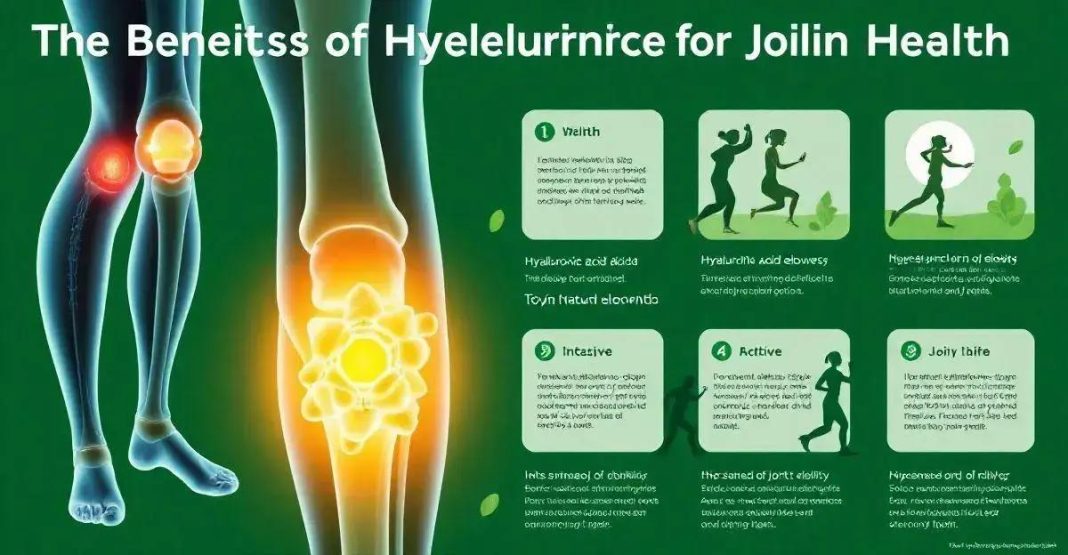Hyaluronic acid is essential for joint health, providing lubrication, reducing inflammation, and supporting cartilage. Incorporating it into your health routine through supplements or injections can lead to improved joint function and a more active, pain-free lifestyle.
If you’re looking for ways to enhance your joint health, you might want to consider hyaluronic acid. This naturally occurring substance plays a crucial role in maintaining the health and functionality of joints. In this article, we’ll explore six key insights into how hyaluronic acid can benefit your joint health and improve your quality of life.
What is Hyaluronic Acid and How Does It Work?
Hyaluronic acid is a naturally occurring substance in the body, primarily found in connective tissues, skin, and synovial fluid that lubricates joints. It is a type of glycosaminoglycan, which is a long chain of sugars that can hold a significant amount of water, making it a critical component for hydration and elasticity in tissues.
Here’s how hyaluronic acid works in relation to joint health:
1. Lubrication: Hyaluronic acid acts as a lubricant in the joints, helping to reduce friction during movement. This lubrication is essential for smooth joint function and can prevent wear and tear on cartilage.
2. Shock Absorption: The high water-binding capacity of hyaluronic acid allows it to absorb shock, which helps protect joints from impact during physical activities. This absorption is crucial for preventing injuries and maintaining joint integrity.
3. Nutrient Delivery: Hyaluronic acid facilitates the transport of nutrients to joint tissues, ensuring they receive the essential substances they need for repair and maintenance. This is vital for overall joint health and longevity.
4. Anti-inflammatory Properties: Hyaluronic acid has been shown to possess anti-inflammatory properties that can help reduce inflammation in the joints. This can lead to decreased pain and improved function for individuals with joint issues.
5. Promotes Cartilage Health: By providing the necessary hydration and support, hyaluronic acid contributes to the health of cartilage, which is crucial for maintaining proper joint function and preventing degenerative conditions.
In summary, hyaluronic acid plays a vital role in maintaining joint health through its lubricating, shock-absorbing, and nutrient-delivering properties. Its ability to reduce inflammation also makes it an essential component for those looking to improve their joint function and overall quality of life.

The Role of Hyaluronic Acid in Joint Lubrication
Hyaluronic acid plays a critical role in joint lubrication, which is essential for maintaining joint health and function. Here’s how hyaluronic acid contributes to effective joint lubrication:
1. Viscosity and Elasticity: Hyaluronic acid has a unique ability to retain water, creating a viscous and elastic fluid that is crucial for joint lubrication. This viscosity allows it to form a protective layer within the synovial fluid, reducing friction between cartilage surfaces during movement.
2. Joint Synovial Fluid: Hyaluronic acid is a primary component of synovial fluid, the fluid that fills joints and acts as a lubricant. It helps ensure that joints move smoothly, allowing for greater flexibility and range of motion.
3. Reduces Friction: By providing a slippery surface, hyaluronic acid minimizes the friction between bones in the joints. This reduction in friction is essential for preventing wear and tear on cartilage, which can lead to joint pain and discomfort.
4. Impact Absorption: The gel-like consistency of hyaluronic acid allows it to absorb shocks during impact activities, such as running or jumping. This shock-absorbing quality helps protect joints from damage and reduces the risk of injuries.
5. Supports Joint Mobility: Effective lubrication from hyaluronic acid enhances joint mobility. Well-lubricated joints can move freely without pain or stiffness, allowing individuals to engage in physical activities without limitations.
In conclusion, hyaluronic acid is essential for joint lubrication, providing the necessary viscosity and elasticity to ensure smooth and pain-free joint movement. Its role in reducing friction and absorbing impact makes it a key component in maintaining overall joint health and function.
How Hyaluronic Acid Reduces Joint Pain and Inflammation
Hyaluronic acid is known for its ability to reduce joint pain and inflammation, making it a valuable component in managing joint health. Here’s how hyaluronic acid accomplishes this:
1. Anti-Inflammatory Properties: Hyaluronic acid has natural anti-inflammatory effects that help to mitigate inflammation in the joints. By reducing inflammatory markers, it can alleviate pain and swelling commonly associated with conditions like arthritis.
2. Enhances Joint Lubrication: By improving the viscosity of synovial fluid, hyaluronic acid ensures that joints are adequately lubricated. This lubrication helps reduce friction between joint surfaces, which can decrease pain during movement and improve overall joint function.
3. Reduces Cartilage Breakdown: Hyaluronic acid helps protect cartilage from degeneration by maintaining its hydration and elasticity. This protective effect can help prevent the progression of joint diseases, which often leads to pain and inflammation.
4. Stimulates Tissue Repair: Hyaluronic acid promotes healing and tissue regeneration. By facilitating the delivery of nutrients and moisture to the joint tissues, it aids in the repair process, reducing pain and inflammation over time.
5. Supports Joint Mobility: By reducing pain and inflammation, hyaluronic acid allows for improved mobility in the joints. Enhanced mobility can lead to increased physical activity, which is essential for maintaining joint health and further reducing discomfort.
In summary, hyaluronic acid effectively reduces joint pain and inflammation through its anti-inflammatory properties, lubrication, and promotion of tissue repair. Incorporating hyaluronic acid into your health regimen can be a beneficial strategy for managing joint pain and improving overall joint function.

Benefits of Hyaluronic Acid for Active Individuals
Hyaluronic acid offers numerous benefits for active individuals, making it an essential supplement for those engaged in regular physical activity. Here are some of the key benefits:
1. Enhanced Joint Lubrication: For active individuals, smooth joint movement is crucial. Hyaluronic acid improves joint lubrication, reducing friction and allowing for better performance during exercises and sports.
2. Reduced Risk of Injury: By maintaining optimal joint function and cushioning, hyaluronic acid helps minimize the risk of injuries related to joint stress and strain. This is particularly important for athletes who subject their joints to high-impact activities.
3. Alleviation of Post-Workout Soreness: Hyaluronic acid can help reduce muscle and joint soreness following intense workouts. By alleviating inflammation and promoting recovery, it allows active individuals to train more consistently.
4. Improved Flexibility and Range of Motion: Regular intake of hyaluronic acid can enhance flexibility in the joints, making it easier for active individuals to perform a wide range of motions without discomfort.
5. Support for Recovery: Hyaluronic acid aids in the repair and regeneration of joint tissues, which is beneficial for active individuals recovering from injuries or overuse. Faster recovery times can lead to better training outcomes and less downtime.
6. Overall Joint Health Maintenance: For those who lead an active lifestyle, maintaining joint health is essential for long-term performance. Hyaluronic acid supports cartilage health and reduces the progression of joint degeneration, ensuring that individuals can continue to engage in their favorite activities.
In conclusion, hyaluronic acid is a valuable supplement for active individuals, providing support for joint lubrication, injury prevention, and overall joint health. Incorporating hyaluronic acid into your routine can help you maintain an active lifestyle while minimizing discomfort and maximizing performance.
Hyaluronic Acid Supplements: What to Know
Hyaluronic acid supplements can be an effective way to support joint health and overall well-being. Here’s what you need to know about these supplements:
1. Types of Supplements: Hyaluronic acid supplements are available in various forms, including capsules, tablets, powders, and liquid formulations. Choose a form that is convenient and suits your preferences.
2. Dosage Recommendations: The appropriate dosage may vary based on individual needs and the specific product. Common dosages range from 50 to 200 mg per day for joint health. Always follow the manufacturer’s recommendations and consult with a healthcare professional for personalized advice.
3. Quality Matters: When selecting hyaluronic acid supplements, look for high-quality products from reputable brands. Ensure that the supplements are free from additives, fillers, and artificial ingredients. Consider third-party testing for quality assurance.
4. Potential Benefits: Hyaluronic acid supplements may help reduce joint pain, improve lubrication, and enhance flexibility. They can also support skin hydration and elasticity, making them beneficial for joint and skin health.
5. Possible Side Effects: Hyaluronic acid supplements are generally considered safe for most individuals. However, some people may experience mild digestive discomfort or allergic reactions. If you have pre-existing health conditions or are taking medications, consult your healthcare provider before starting any new supplement.
6. Combining with Other Supplements: Hyaluronic acid can be combined with other joint-supporting supplements, such as glucosamine and chondroitin, for enhanced benefits. However, always check with a healthcare professional before combining supplements.
In summary, hyaluronic acid supplements can be a valuable addition to your health routine, especially for supporting joint health. By understanding the different types, dosages, and potential benefits, you can make informed decisions about incorporating them into your daily regimen.

Real-Life Success Stories: Hyaluronic Acid and Joint Health
Real-life success stories can provide valuable insight into the effectiveness of hyaluronic acid for improving joint health. Here are some inspiring accounts from individuals who have experienced significant benefits:
1. Jennifer’s Experience: After struggling with knee pain for years due to osteoarthritis, Jennifer decided to try hyaluronic acid supplements. Within a few weeks, she noticed a remarkable reduction in pain and increased mobility. Jennifer was able to return to her favorite activities, such as hiking and dancing, without discomfort.
2. Mark’s Transformation: Mark, a 60-year-old avid golfer, faced chronic joint stiffness that limited his ability to enjoy the sport. After incorporating hyaluronic acid into his daily routine, he experienced less stiffness and improved joint flexibility. Now, Mark plays golf regularly and even participates in tournaments.
3. Lisa’s Recovery: Lisa, a 45-year-old fitness enthusiast, often experienced soreness in her joints after intense workouts. She began taking hyaluronic acid supplements and found that her recovery times improved significantly. With reduced soreness, Lisa can maintain her training schedule without interruptions.
4. Tom’s Success Story: Tom, a construction worker in his 50s, dealt with persistent joint pain from years of physical labor. After trying hyaluronic acid injections recommended by his doctor, he experienced a significant decrease in pain and was able to return to work with greater ease and comfort.
5. Sarah’s Journey: Sarah, a 30-year-old yoga instructor, was concerned about joint health as she aged. She started taking hyaluronic acid supplements and noticed improved joint lubrication, which enhanced her flexibility during yoga practice. Sarah now feels more confident in her ability to perform complex poses without discomfort.
These success stories highlight the positive impact of hyaluronic acid on joint health. Whether you’re dealing with chronic pain, stiffness, or looking to maintain joint function, these individuals’ experiences demonstrate that hyaluronic acid can be an effective solution for supporting joint wellness.
Conclusion
In conclusion, hyaluronic acid is a powerful ally in promoting joint health and enhancing overall well-being.
Its ability to improve joint lubrication, reduce pain and inflammation, and support cartilage health makes it an essential component for those looking to maintain mobility and an active lifestyle.
Real-life success stories illustrate the effectiveness of hyaluronic acid, providing inspiring examples of how it can transform the quality of life for individuals dealing with joint issues.
Incorporating hyaluronic acid into your health regimen—whether through supplements, dietary sources, or injections—can lead to significant benefits for your joints.
As you consider your options for supporting joint health, remember that taking proactive steps can make a lasting difference in your comfort and mobility.
By understanding the benefits and exploring various ways to include hyaluronic acid in your routine, you can take charge of your joint health and enjoy a more active, pain-free life.
Frequently Asked Questions about Hyaluronic Acid and Joint Health
What is hyaluronic acid and how does it help joints?
Hyaluronic acid is a naturally occurring substance in the body that helps lubricate joints and maintain cartilage health, reducing pain and improving mobility.
How does hyaluronic acid reduce joint pain?
Hyaluronic acid reduces joint pain by providing lubrication, enhancing shock absorption, and possessing anti-inflammatory properties that alleviate discomfort.
Are hyaluronic acid supplements effective?
Yes, many individuals report significant improvements in joint health and reduced pain when taking hyaluronic acid supplements or receiving injections.
What are the different forms of hyaluronic acid supplements?
Hyaluronic acid supplements come in various forms, including capsules, tablets, powders, and injectable solutions for joint therapy.
Is hyaluronic acid safe to use?
Hyaluronic acid is generally considered safe for most individuals, though some may experience mild side effects. Always consult with a healthcare professional before starting any new supplement.
Can I combine hyaluronic acid with other joint supplements?
Yes, hyaluronic acid can be combined with other joint-supporting supplements, such as glucosamine and chondroitin, but it’s best to consult a healthcare provider for personalized recommendations.


